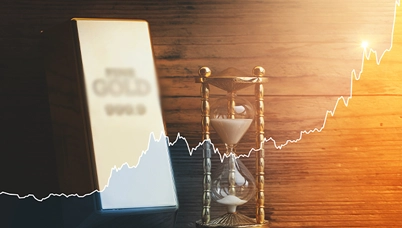Gold monthly view for November 2020
Posted On Monday, Dec 07, 2020
As we move into the final month of this eventful year, market sentiment is mixed. Investors seem to be weighing the mounting virus case count against optimism of vaccine breakthroughs.
On the surface, risk and uncertainty seem to have ebbed. The progress made on the vaccine front has spurred optimism about a return to normalcy. Concerns of a constitutional crisis in the US are fading with Trump accepting a Biden transition at the White House. This has boosted risk assets and hurt gold. Prices ended the month 5.4% lower, at $1776/ounce. Gold prices seem stretched to the downside relative to the fundamentals. This is because markets are getting carried away by the news of effective vaccines.
If you dig deeper, you will find that risks still persist.
1) Widespread access to a vaccine remains months away
Effectiveness, regulatory approval, large scale manufacturing, costs and distribution of the vaccines still need to be worked out. So realistically the vaccine isn't coming to local pharmacies for the general public any time soon. And a second wave of the disease is already here.
2) A return to normalcy is a long way and prone to setbacks
The economic damage caused by the pandemic has been severe. Businesses have shut down and millions have lost their livelihoods. Therefore, expecting a full and immediate restoration of economic activity is naive. In fact, with a new wave of cases in the United States and Europe, a complete reversal of the Great Lockdown has been further delayed. This is hurting the fragile recovery. The World Bank estimates that a full recovery will take up to 5 years. The global financial crisis, which was largely a financial crisis also took 7 years for full recovery. The COVID-19 crisis is much more severe in comparison.
3) National debts of governments are mounting
For instance, the US national debt has reached approximately 140% of the nation’s annual economic output. The debt has jumped a massive $4.8 trillion in 2020 to touch $27 trillion as the government rolls out fiscal measures to counter the economic damage. These debt loads impact an economy’s potential to grow. They also weaken the purchasing power of fiat paper currencies. Such unprecedented expansion of balance sheets could potentially lead to defaults and debt crises in the long run. Similar to the European Debt crisis which followed the Global Financial crisis of 2008.
4) The gush of liquidity is keeping equities elevated
Stock markets have never been as expensive as they are today. The Nifty 50 P/E ratio has jumped up from 28 at the start of 2020 to 35 as of November end. The S & P 500’s ratio has jumped up from 25 to 37. This is in spite of weak fundamentals. These soaring valuations are a result of massive liquidity injections by central banks. Investors seem to be ignoring near-term issues such as surging global Covid-19 infections, and instead looking ahead to 2021.
5) Real interest rates to go deeper into the red amid rising inflation
The global financial crisis of 2008 made central banks keep interest rates near zero for 6 years. The economic damage caused by the pandemic is much larger and is still ongoing. Not surprising then that central banks like the Federal Reserve have given themselves more room to maintain ultra-low rates. This is to support the economy over the next few years by allowing inflation to run higher. Stimulus from governments to support the recovery will drive inflation as money trickles down the real economy. This will fuel a deeper drop in real or inflation-adjusted bond yields in the medium-to-longer term.
An understanding of these risks and an appreciation for gold’s stabilizing role in times of heightened risk and uncertainty, make holding gold essential to reduce portfolio risks.
Moving on to the developments on the policy front, it's more of the same.
1) Federal Reserve expected to increase asset purchases
Fiscal stimulus in the US was not expected during the lame-duck session. But another wave of cases has resulted in state level restrictions that could threaten the economic recovery. The effects of previous fiscal stimulus are also fading. In addition, Treasury Secretary Steven Mnuchin has said that he would allow the central bank's emergency lending programs that were rolled out in March to expire at year-end. The Federal Reserve is thus expected to increase its purchases of government debt to more than $120 billion monthly in the coming weeks. This will help keep the economic recovery from caving in and reverse a recent rise in Treasury yields.
2) ECB too has big stimulus plans
The Bank’s President Christine Lagarde has said that a coronavirus vaccine is not a game changer for the institution’s monetary policy. Europe is staring at a worsening of the current economic slump with a second wave of infections and new lockdowns. The ECB is thus expected to announce an additional monetary stimulus of 500 billion euros in December.
3) Fiscal spending in the US to be stepped up
Even with a Republican-led Senate, Biden will get a stimulus bill, though smaller, passed early next year. But till that happens, gold prices will continue to witness weakness. With former Fed Chair Janet Yellen, who was viewed as pro-stimulus, being the President elect’s top choice for Treasury Secretary, hopes of a fiscal package have got a boost.
As evident, global policy makers are continuing to resort to monetary inflation, credit expansion and government spending to tackle the economic fallout of the pandemic. With the extent of damage caused by this health cum economic crisis, it is hard to imagine a scenario where governments and central banks will change course any time soon. The result will be currency debasement and years of low interest rates in order to service the debt.
Gold has potential to store value over long time periods. It also generally does well in times of low nominal and negative real interest rates. It will thus continue to be a strategic element of investment portfolios and generate risk adjusted returns for the investor.
Lastly, consumer demand for gold has been weak this year. This is because of the economic hardships brought about by Covid-19. But it is expected to recover going forward as consumers in India and China take advantage of the price correction. This will boost gold prices.
Source: Bloomberg, World Gold Council
Disclaimer, Statutory Details & Risk Factors:
The views expressed here in this article / video are for general information and reading purpose only and do not constitute any guidelines and recommendations on any course of action to be followed by the reader. Quantum AMC / Quantum Mutual Fund is not guaranteeing / offering / communicating any indicative yield on investments made in the scheme(s). The views are not meant to serve as a professional guide / investment advice / intended to be an offer or solicitation for the purchase or sale of any financial product or instrument or mutual fund units for the reader. The article has been prepared on the basis of publicly available information, internally developed data and other sources believed to be reliable. Whilst no action has been solicited based upon the information provided herein, due care has been taken to ensure that the facts are accurate and views given are fair and reasonable as on date. Readers of this article should rely on information/data arising out of their own investigations and advised to seek independent professional advice and arrive at an informed decision before making any investments.
Mutual fund investments are subject to market risks read all scheme related documents carefully.
Please visit – www.QuantumAMC.com to read scheme specific risk factors. Investors in the Scheme(s) are not being offered a guaranteed or assured rate of return and there can be no assurance that the schemes objective will be achieved and the NAV of the scheme(s) may go up and down depending upon the factors and forces affecting securities market. Investment in mutual fund units involves investment risk such as trading volumes, settlement risk, liquidity risk, default risk including possible loss of capital. Past performance of the sponsor / AMC / Mutual Fund does not indicate the future performance of the Scheme(s). Statutory Details: Quantum Mutual Fund (the Fund) has been constituted as a Trust under the Indian Trusts Act, 1882. Sponsor: Quantum Advisors Private Limited. (liability of Sponsor limited to Rs. 1,00,000/-) Trustee: Quantum Trustee Company Private Limited. Investment Manager: Quantum Asset Management Company Private Limited. The Sponsor, Trustee and Investment Manager are incorporated under the Companies Act, 1956.
Related Posts
-

Gold Monthly for February 2026
Posted On Tuesday, Feb 03, 2026
Gold began the new year on a strong footing, carrying forward the momentum from the previous year and extending its upward rally.
Read More -

Gold Monthly for January 2026
Posted On Thursday, Jan 01, 2026
Gold Market Review and Outlook: 2025–2026
Read More -

Gold Monthly for September 2025
Posted On Tuesday, Sep 02, 2025
August 2025 saw renewed strength in gold, with international prices rising 4.79% for the month and posting a robust 37.75% year-on-year gain.
Read More



